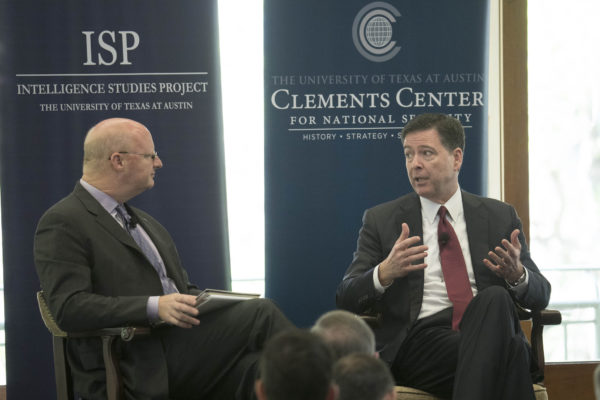
Last March, then-FBI Director James Comey made a pitch to students at The University of Texas at Austin about their role in future of national security.
He spoke at the “Intelligence in Defense of the Homeland” symposium about what he called the biggest threat facing the nation’s security: cyberterrorism. The rise of terrorist organizations such as the Islamic State group through social media and the ongoing battle over encryption technology were at the top of the list of cybersecurity threats.
These new threats highlight the need for new talent in the national security field. However, the government is struggling to attract the right candidates.
“Where is the talent? I don’t want to say too much,” Comey joked to an audience of students, faculty members and colleagues at the Etter-Harbin Alumni Center on March 23. “Because I’m trying to steal your talent.”
Visits from national security heavy hitters are becoming the new normal on the Forty Acres. CIA Director Mike Pompeo also visited last year for the 2017 Texas National Security Forum, and Secretary of State and UT alumnus Rex Tillerson was on campus Thursday, February 1, 2018 to address national security challenges facing the Western Hemisphere.

UT is expanding the conversation beyond the Washington Beltway, and it has put Texas on the map as a center of expertise in intelligence and national security issues.

“This is not an accident,” said Robert Chesney, director of the Robert Strauss Center for International Security and Law and the James Baker Chair at UT Austin’s School of Law. “Several years ago, the Strauss and Clements centers concluded that top universities were paying insufficient attention to national security in general and particularly the intelligence community. This was especially true for academics outside of Washington.”
Chesney — in partnership with William Inboden, executive director and the William Powers, Jr. Chair at the William P. Clements, Jr. Center for National Security and a professor at the LBJ School of Public Affairs— created an extensive network of programs with a shared mission to train the next generation of national security scholars and policymakers at UT Austin.

Although there is overlap and collaboration in the work that they do, each center brings different expertise to the table.
“The Strauss Center leads when it comes to matters of security-related technologies and the legal aspects of security,” said Chesney. “The Clements Center leads when it comes to matters of history and grand strategy. For matters of common concern such as intelligence or terrorism, our typical model is to cooperate closely.”
During the past decade the Strauss Center has been researching and educating UT students on pressing contemporary policy challenges. Their current programs cover topics ranging from cybersecurity and artificial intelligence to the rise of China and resource scarcity in the Middle East.
Whereas the Strauss Center focuses on emerging issues, the Clements Center highlights the context.
“Most national security policymakers have not been adequately trained on how to use history in their decision-making, and most academic history departments do not produce research that is relevant and accessible to policymakers,” said Inboden. “It is important to bridge this divide through scholarly research and teaching history, strategy and statecraft in order to advance wise and effective national security policy.”

Together, the two centers have rapidly helped UT Austin develop a reputation in Washington as a university where national security and intelligence are taken seriously.
In 2015 they launched the Intelligence Studies Project, which works to ensure that undergraduate and graduate students have the opportunity to learn about the role intelligence plays in shaping our national security policies. The Intelligence Studies Project has hosted multiple high-profile events and conferences, including the ones mentioned above.
“We invest in close professional relationships with senior intelligence officials in Washington, D.C., to enrich our courses, ensure the relevance of UT’s research, and to create opportunities for our students, faculty and researchers to engage directly with the elected and appointed officials responsible for protecting the nation,” said Stephen Slick, director of the Intelligence Studies Project and a professor at the LBJ School of Public Affairs.
Slick, who served for 28 years in the CIA and at the White House before moving to Austin, adds: “There is no aspect of U.S. intelligence that cannot and should not be improved by serious academic research and commentary. We will be successful if we make progress in educating the future leaders at UT Austin in how citizens can and should hold these agencies accountable for upholding our laws and democratic principles.”




